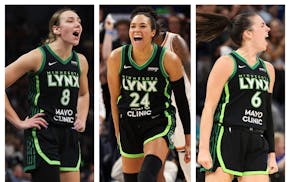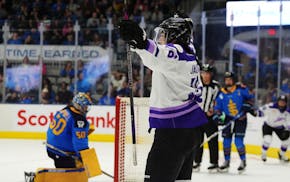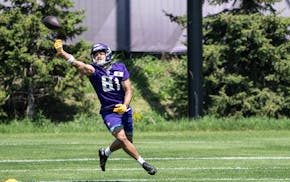Major League Soccer this week eliminated Las Vegas as a potential site for the next round of expansion, leaving Minnesota and Sacramento as the apparent front-runners for a 24th franchise.
While the prospective ownership groups from those two cities have a bit clearer picture of where they stand with the MLS — indeed, some believe both could get franchises if Miami's stadium problems are not resolved — there's no clear financial picture of the league they would be entering. That's because the MLS collective bargaining agreement between the league and players expired Jan. 31.
The two sides continue to talk, although the rhetoric from players is hardly encouraging.
Several players, in fact, have said they are prepared to strike before the March 6 season opener if the league doesn't come up with an acceptable offer. The sticking point is that an acceptable offer would likely include free agency, a right the players currently lack, and that could change the way the league is structured.
The uncertainty has not deterred Minnesota's two potential ownership groups — the Wilf family that owns the Vikings, and a Bill McGuire-led consortium that also includes the Pohlad family, owners of the Twins, and Timberwolves owner Glen Taylor. Both remain in pursuit of a team, and both groups along with Sacramento have made presentations to the MLS. The league also has had meetings with representatives from St. Louis and San Antonio, although it's generally believed those two cities are getting in line for a later expansion round.
MLS Commissioner Don Garber told reporters in mid-January that he was "bullish on Minneapolis. We think it's a good market, it's an important market for us strategically from a geographic perspective." A league spokesman said Friday that a decision is expected during the first six months of this year.
"We're paying attention [to the negotiations] and staying in communication with MLS leadership and moving our bid forward,'' said Lester Bagley, who represent the interests of the Wilf family.
The other prospective Minnesota ownership team is already focused solely on soccer, but in this case that's McGuire's Minnesota United FC of the North American Soccer League, a step below the MLS in stature.
"It's going to be a challenging year," said United President Nick Rogers, citing not the MSL negotiations or expansion process but the competition in the NASL. At least Rogers knows the NASL will be playing this season, something the 20-year-old MLS can't maintain. He, like Bagley, declines to discuss the current MLS-union negotiations.
Not much progress
The MLS-player negotiations this week added a federal mediator to the process after the talks reportedly had reached an impasse. The lack of movement is understandable, given the stakes.
Until now, players' rights in areas such as free agency and salary have been secondary to the survival of the league. But the MLS in 2015 has a new $90 million annual TV contract — double the old deal — and averaged more than 19,000 fans a game in 2014 — the highest total in MLS history.
Players feel as if it's time they got a bigger piece of the pie. Union leaders have said its members won't play in the March 6 opener without a new deal.
"It's a loss for everybody if that happens. But sometimes those things can't be avoided," L.A. Galaxy defender Todd Dunivant, a senior member of the union's executive council, told the Los Angeles Times. "The players are ready to do what needs to be done to get what we feel is right."
Free agency to this point has been thwarted by the league's single-entity structure, which is unique among American's major professional sports and any of the world's top professional soccer leagues. Player contracts are signed with the league, not individual teams. The owners are league shareholders, rather than traditional sports owners who are able to run their teams in an independent manner.
Teams have a strict salary cap ($3.7 million per team), but the league allows each team three salary cap exceptions — known as the Designated Player Rule (DPR), which went into effect when David Beckham signed with Los Angeles in 2007.
The lack of free agency, coupled with the salary cap and Designated Player Rule, has led to significant disparity in player salaries. Some DPR players, such as Orlando City's Kaka and Toronto FC's Michael Bradley, earn more than $6.5 million. But the league minimum salary is $36,500, and 54 players last year were paid less than $37,000.
"The MLS did what it needed to do to make sure it would survive," said St. Paul's Tony Sanneh, a former MLS player. "I think the league is now comfortable it's going to be here."
And that means players want that bigger share of the pie — a significant rise in the salary cap, plus free agency. But the single-entity structure does not readily allow for free agency because the league would, in essence, be bidding against itself for players. At present, players reaching the end of their contract have to go through waivers and re-entry before they can negotiate with other teams, making the MLS the only major professional sports franchise without free agency.
Garber, the MLS commissioner, has talked about making the league one of the world's best soccer leagues by 2022. But Bob Foose, executive director of the players' union, told SI.com that the MLS "can't be structured so drastically different from every other league in the world and think somehow we're going to compete with them."
Sanneh said the biggest fight in the negotiations will be "what to do with [the single-entity] structure. If there's free agency, then players could come back in a couple of years and challenge single-entity."
Garber, in his state of the league address in December, noted that the league as a whole still lost $100 million in 2014 and that only about half the franchises are profitable. MLS deputy commissioner Mark Abbott said that as a result of the losses, "we are not in a position where we are discussing how to divide profits with the players, but rather what is an appropriate level of investment and where the investment should be made given the reality of our financial condition."
All of which leaves the 2015 season — and continued league growth — hanging in the balance. Sanneh said a work stoppage would be "a real shame" for all involved.
"There's so much momentum after the World Cup last year," Sanneh said. "This is not a good time to stop the growth and forward progress. It's been hard to get supporters [for the league], and a work stoppage would risk losing 10 to 25 percent of the fan base."
Which is why potential new owners are paying close attention.

As Lynx 'run it back' this season, their bedrock is trio from the Class of '19

Paddack clings to perfection into the sixth inning, pitching the Twins past the Giants
Reusse: Twins play Giants, triggering Mays memories and a question: Can we get the Black players back?

Frost turn away Toronto, even PWHL playoff series at a win apiece
